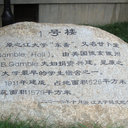Splenectomy protects experimental rats from cerebral damage after stroke due to anti-inflammatory effects.
Հիմնաբառեր
Վերացական
BACKGROUND
A recent study demonstrated that the inflammatory response accompanying necrotic brain injury played an important role in stroke. Thus, inhibition of this response may help to stop the expansion of infarcts. It has been also shown that the spleen, a major peripheral immune organ, plays a role in stroke-induced immune responses. This study aimed to establish rat models of middle cerebral artery occlusion (MCAO) and to investigate the effect of splenectomy and possible mechanisms in that rat models.
METHODS
Infarct size in a stroke model was measured with the Nissl body staining method, numbers of inflammatory cells in ischemic regions were detected by immunofluorescence staining, and inflammatory factors were assayed by enzyme-linked immunosorbent assay and real-time polymerase chain reaction (PCR) in brain homogenates and sera. The significance of differences was determined by one-way analysis of variance (ANOVA) followed by the least significant difference post hoc test.
RESULTS
Infarct size in the brain of rats that underwent splenectomies 2 weeks before permanent MCAO ((34.93 ± 3.23)%) was over 50% smaller than that of rats subjected to the stroke surgery alone ((74.33 ± 2.36)%, P < 0.001; (77.30 ± 2.62)%, P < 0.001). Lower numbers of T cells, neutrophils, and macrophages in brain tissue and lower levels of pro-inflammatory cytokines, such as interleukin (IL)-1β and tumor necrosis factor (TNF)-α, were observed in rats that underwent splenectomies, compared with the two other groups, but splenectomized rats showed higher levels of the anti-inflammatory factor IL-10 in the brain.
CONCLUSIONS
The mechanism(s) by which splenectomy protects brain from damage induced by stroke may correlate with the decreased numbers of inflammatory cells and changes in inflammatory cytokines.


